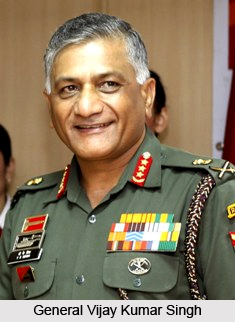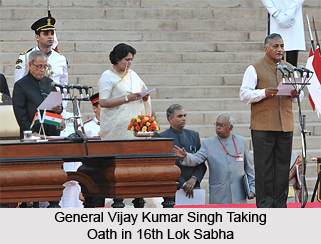 General Vijay Kumar Singh (retired) is an Indian politician serving the Modi Government in the 16th Lok Sabha as the Minister of State for External Affairs, Development of North Eastern Region (Independent Charge) and Overseas Indian Affairs. A retired Indian Army officer, he has served as the 24th Chief of Army Staff of the Indian Army. In the Indian politics he represents the Ghaziabad constituency in Uttar Pradesh and won the 2014 general elections by a broad margin which marked the second highest margin of victory after Narendra Modi. He also owns the credit of being the first commando to be promoted as General. He was also the first serving Indian Military Chief who had taken the Government to court. He joined the Bharatiya Janata Party (BJP) in the year 2014.
General Vijay Kumar Singh (retired) is an Indian politician serving the Modi Government in the 16th Lok Sabha as the Minister of State for External Affairs, Development of North Eastern Region (Independent Charge) and Overseas Indian Affairs. A retired Indian Army officer, he has served as the 24th Chief of Army Staff of the Indian Army. In the Indian politics he represents the Ghaziabad constituency in Uttar Pradesh and won the 2014 general elections by a broad margin which marked the second highest margin of victory after Narendra Modi. He also owns the credit of being the first commando to be promoted as General. He was also the first serving Indian Military Chief who had taken the Government to court. He joined the Bharatiya Janata Party (BJP) in the year 2014.
Early Life of General Vijay Kumar Singh
General Vijay Kumar Singh was born on 10th May 1951 to a Rajput family at a village called Bapora in Bhiwani district of the Indian state Haryana. His father served the Indian Army as a Colonel while his grandfather was a Junior Commissioned Officer (JCO). General Vijay Kumar Singh did his schooling from Birla Public School, Pilani, Rajasthan, and graduated from the Defence Services Staff College. In the United States Army Infantry School he was an honours graduate and was also a graduate of the Rangers Course at Fort Benning and the United States Army War College in Carlisle, Pennsylvania. He stood first in the combat operations in the US for the Rangers course.
 Career of General Vijay Kumar Singh in Indian Army
Career of General Vijay Kumar Singh in Indian Army
On 14th June 1970 General Vijay Kumar Singh was commissioned into the 2nd Battalion of the Rajput Regiment. Subsequently he commanded the unit along the Line of Control with Pakistan. His areas of expertise encompass high altitude operations and counter insurgency operations. Various positions which he served throughout his career include Brigadier General Staff of a Corps in Operation Parakram during the mobilization of Indian troops on the border in the wake of the attack on the Indian Parliament in 2001; Military Operations Directorate at the Army Headquarters; Instructor in the Indian Military Training Team (IMTRAT) headquarters in Bhutan and Commanded Ambala-based 2 Corps and Jalandhar based 11 Corps in Punjab state. On 31st March 2010 he was designated as the Chief of Army Staff, also becoming the first commando to achieve the position. He retired with the same designation on 31st May 2012.
Political Career of General Vijay Kumar Singh
Post retirement, General Vijay Kumar Singh expressed his support for the anti-corruption movement. On 1st March 2014 he joined the Bhartiya Janata Party and in the general elections won the seat from Ghaziabad constituency.
Achievements of General Vijay Kumar Singh
General Vijay Kumar Singh has been the recipient of Param Vishisht Seva Medal (PVSM), Ati Vishisht Seva Medal (AVSM) and Yudh Seva Medal (YSM) for his distinguished contributions to the Indian Army. He has also been honoured as Honorary Colonel of The Brigade of Guards. He was inducted to the United States Army War College International Fellows Hall of Fame on 11th March 2011. Being the 33rd International Fellow, he is also accredited as the first Indian Armed Forces officer to be inducted.
Personal Life of General Vijay Kumar Singh
General Vijay Kumar Singh is married to Bharti Singh and the couple is blessed with two daughters. General Vijay Kumar Singh has also authored a book titled Courage and Conviction: An Autobiography.




















